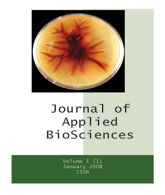Journal of Applied Biosciences (J. Appl. Biosci.) [ISSN 1997 - 5902]
Volume 20: 1172 - 1182. Published August 7, 2009.
Glutathione status and its effect on protein content during drought and subsequent rehydration in two spring wheatcultivars (Triticum aestivum L.)
Mohamed M. Ibrahim
Science Department (Biology section), Teachers College, King Saud University, P.O. Office 4341- 11491, Saudi Arabia.
Corresponding author email: mibrahim@ksu.edu.sa
ABSTRACT
Objective: Wheat crop may experience water deficit during its life cycle, which induces oxidative stress. The present study evaluated the role of oxidative stress management in the leaves of two wheat (Triticum aestivum L.) cultivars, Veery (drought tolerant) and Sids-1(drought susceptible) under drought stress and subsequent rehydration. The role of glutathione in the antioxidative defense system provides a rationale for its use as a stress marker.
Methodology and results: When wheat seedlings were subjected to progressing drought, the initial response was a slight oxidation of the glutathione pool, followed by increased glutathione concentrations. When the stress increased, glutathione concentrations dropped and redox state became more oxidized, which marked the degradation of the system. Proteolytic activities were assayed using azocasein in the case of vacuolar proteinases at pH 5.0. The azocaseinolytic activity was found to be confined to the vacuoles. Drought stress increased vacuolar azocaseinolytic activity at both stages of water shortage treatments, but the increase was significantly lower after rehydration and in the tolerant cultivar.
Conclusion and application of findings: The results obtained indicate that protein synthesis and degradation are affected by dehydration and it is genotype dependent. Within such response patterns the glutathione system is a valuable stress marker in ecophysiological studies.
FULL PAPER [PDF AVAILABLE HERE]
